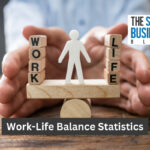Millions of people decide to change careers every year as the following career change statistics will show.
Changing careers can be challenging and scary, but at the end of the day it can be rewarding.
If you want to shift your career elsewhere, you have a chance to start anew and fresh.
You can choose something that you’re passionate about that is exciting.
In this article, we will explore the statistics related to making a career change and deliver some tips at the end.
Let’s explore career change by the statistics.
Post Contents
- 1 Key Career Change Statistics
- 2 Career Change Statistics in 2024
- 2.1 1. The Average Individual Changes Careers Between 5 and 7 Times in Their Life.
- 2.2 2. Around 58% of Workers in The United States Are Looking to Change Careers.
- 2.3 3. The Best Age Group for Changing Careers Is Between 25 and 35.
- 2.4 4. 96% of Employees Are Seeking New Jobs in 2023.
- 2.5 5. 5.5 Years Is the Longest Median Length of Time in A Job for Managers and Professionals.
- 2.6 6. 3.2 Years Is the Shortest Median Time at Work and It’s Among Service Workers.
- 2.7 7. Workers between 25 and 34 years old tend to stay at jobs for a median time of 3.2 years.
- 2.8 8. 69% of Gen Z Workers Say They Don’t Enjoy Balance in Their Work and Personal Life.
- 2.9 9. Only 7% of American Workers Feel that Their Job Is Excellent.
- 2.10 10. 20% of American Workers Said They Would Accept a Pay Cut for Better Work-Life Balance.
- 2.11 11. One-Third of American Workers Under 40 Years Old Have Considered Changing Careers Over the Past Two Years.
- 2.12 12. 64% of Employed Parents Have Considered Changing Careers.
- 2.13 13. Only 46% of College Graduates Have Jobs in Their Major.
- 2.14 14. Of Workers Making Under $30,000 Annually, 52% Favor Flexibility Over Pay.
- 2.15 15. 62% of American Workers Want More Job Security and Stability.
- 3 FAQs
- 3.1 What Are Some Benefits of Changing Your Career?
- 3.2 How Do I Know if I’m Ready to Make a Career Shift?
- 3.3 What Steps Do You Need to Take Before Changing Careers?
- 3.4 What Are Some Challenges You Need to Know Before Switching Careers?
- 3.5 What Are Some Tips for Having a Successful Career Change?
- 3.6 What Are Some Resources You Can Use when Considering a Career Change?
- 4 Conclusion
- 5 Sources
Key Career Change Statistics
- The average individual changes careers between 5 and 7 times in their life.
- Around 58% of workers in the United States are looking to change careers.
- The best age group for changing careers is between 25 and 35.
- 96% of employees are seeking new jobs in 2023.
- 5.5 years is the longest median length of time in a job for managers and professionals.
- 3.2 years is the shortest median time at work and it’s among service workers.
- Workers between 25 and 34 years old tend to stay at jobs for a median time of 3.2 years.
- 69% of Gen Z workers say they don’t enjoy balance in their work and personal life.
- 20% of American workers said they would accept a pay cut for better work-life balance.
Career Change Statistics in 2024

1. The Average Individual Changes Careers Between 5 and 7 Times in Their Life.
It’s not unusual for people to want to change careers.
This is shown by the fact that working people on average change careers between 5 and 7 times in their lifetime.
Additionally, by the time someone is 42 years old, they could have already had 10 jobs.
Today, 30% of the labor force will change careers every year.
(Career Advice Online)
2. Around 58% of Workers in The United States Are Looking to Change Careers.
Over half of workers (58%) in the United States are currently seeking career changes.
Moreover, another 25% say they have already attempted or successfully changed their career or job.
Among all the changes in the job market and the workforce, this isn’t surprising.
(FlexJobs, HRDive)
3. The Best Age Group for Changing Careers Is Between 25 and 35.
According to research, the best time in your life to change careers is when you’re between 25 and 36 years old.
While people change careers across their working lifetime, there are fewer risks and more benefits among this younger crowd.
You may be more likely to stay at a job where you are the happiest.
(The College for Adult Learning)
4. 96% of Employees Are Seeking New Jobs in 2023.
A massive 96% of workers in 2023 are looking for new jobs. Most of them are doing this to increase their pay.
The current workforce considers job-hopping to be the ultimate method of making more money.
Moreover, these job-hoppers are seeking jobs with more flexibility.
(CNBC)
5. 5.5 Years Is the Longest Median Length of Time in A Job for Managers and Professionals.
In terms of career level and how long someone stays in a job role, 5.5 years seems to be the longest term among professionals and managers.
This type of statistic varies between age, occupation, and other factors.
(ApolloTechnical)
6. 3.2 Years Is the Shortest Median Time at Work and It’s Among Service Workers.
When we look at the occupation where people spend the shortest time working, we see it’s among those in the service occupational fields.
People working in service occupations only stick with a job for a median time of 3.2 years.
(ApolloTechnical)
7. Workers between 25 and 34 years old tend to stay at jobs for a median time of 3.2 years.
Millennials and some Gen z workers, aged 25 to 34, also stay at jobs for only a median period of 3.2 years.
This may or may not correlate with service occupations, but it is common among this age group.
(ApolloTechnical)
8. 69% of Gen Z Workers Say They Don’t Enjoy Balance in Their Work and Personal Life.

Many workers of all working age groups take issue when their work-life balance is off.
However, Gen Z workers are the most dissatisfied with their work-life balance at 69%.
Baby Boomers are right behind Gen Z at 63% and Gen X is next with 55% saying their work-life balance isn’t good.
Millennials may have some issues with work-life balance, but they are more satisfied with theirs at 48%.
(FitSmallBusiness, Good Hire)
9. Only 7% of American Workers Feel that Their Job Is Excellent.
A whopping 93% of American workers haven’t found their dream job, leaving only 7% who say their job is excellent.
These figures differ among occupations and industries. This is the average overall percentage calculated for job satisfaction.
(MoneyPenny)
10. 20% of American Workers Said They Would Accept a Pay Cut for Better Work-Life Balance.
Since the pandemic, workers realize how much they value better work-life balance.
In fact, one poll revealed that 20% of American workers said they would take a pay cut just to achieve better work-life balance.
Therefore, these workers seek jobs that offer a good work-life balance.
(Prudential)
11. One-Third of American Workers Under 40 Years Old Have Considered Changing Careers Over the Past Two Years.
The workforce in the United States is mostly made up of workers under 40 years old.
According to data, around one-third of them have considered making a career change.
The general consensus is that things changed after the global pandemic, giving workers reason to change their workplace or career.
(Fit Small Business)
12. 64% of Employed Parents Have Considered Changing Careers.
According to studies, 64% of working American parents have considered quitting their current jobs or considered changing careers.
A shift in careers is a big undertaking, but many workers in America with children consider it.
After the pandemic, people changed their mindsets and, in some instances, it made it more challenging for working parents.
(Catalyst)
13. Only 46% of College Graduates Have Jobs in Their Major.
In terms of education fields of study, 46% of college graduates don’t work in their field of interest.
According to a survey, 29% say they work in a different field and 16% say they are unemployed.
(Intelligent)
14. Of Workers Making Under $30,000 Annually, 52% Favor Flexibility Over Pay.
Not everyone in the workplace is there just to make money.
While money is needed to survive in society, some workers in America prefer flexibility over a higher income.
In fact, a significant 52% responded to a survey and said they would rather have more flexibility in their job than more pay.
(Bankrate)
15. 62% of American Workers Want More Job Security and Stability.

Job security and stability is almost a lost cause; or is it?
The latest stats show that 62% of workers want more stability in their workplace, especially since the global pandemic.
Does this mean that small businesses can’t compete?
No, it doesn’t. However, they must prove that their product and business are stable.
(Prudential)
FAQs
What Are Some Benefits of Changing Your Career?
Our research found that these are some of the benefits of career change:
• Finding and working in a career that you feel passionate about: When you feel passionate about what you’re doing you’re more apt to feel happy and fulfilled.
• Earning more money: Even if your career change isn’t about money, you can still earn more money in your new career.
• Having better work-life balance: There are several careers that offer better flexibility, which can result in more time for your personal life.
• Learning new skills and growing professionally: In some cases, a career change can challenge you and help you learn more things that interest you.
How Do I Know if I’m Ready to Make a Career Shift?
Yes. There are signs that you’re ready to make a change in your career.
Here are some of these signs:
• You aren’t feeling challenged or you’re feeling bored in your current career.
• You have stopped feeling passionate about what you’re doing.
Your current career isn’t progressing as you expected.
• You have started feeling stressed and/or burned out.
• You’re feeling like you want to learn some new skills or find something you can feel passionate about.
What Steps Do You Need to Take Before Changing Careers?
Even though changing careers is a very personal choice with various factors to consider, we have found some basic elements to get you started.
1. Research: Before you make changes in your career, you need to consider your interests and your options.
You will want to learn about the current job market and any extraneous educational requirements of your new career choice. Also look at the salary potential.
2. Network: Get out there and chat with people who are working in the career field you’re considering.
You may also want to think about going to specific industry events, connect with relevant users on LinkedIn, and talk to your family and friends about it.
3. Update your resume and cover letter: You need to update your cover letter, resume, and/or your CV to fit your new career.
It’s likely you’ll need to highlight your experience and any new skills you have developed since you last created your resume.
Plus, your cover letter needs to be personalized to the company you’re considering and relevant to the career.
4. Apply for jobs: After you have completed these steps, you’re ready to start applying to jobs in the field you desire.
Remember that you may need to be prepared to start at the bottom of the ladder in your new career.
What Are Some Challenges You Need to Know Before Switching Careers?
As with everything we do, the benefits of changing careers come with challenges that you need to know.
Prepare your mind for these challenges and don’t let them stop you.
• Finding a job: Naturally, you can expect to have some challenges in finding work in your new career, especially if you are lacking in specific experience or skills.
• You’re starting over: Starting over in a new career is a challenging undertaking that is often life changing. Hopefully, the change will be a positive one as you expect. Never be afraid to ask for help.
• Financial challenges: Between considering changing careers and finding work, you may experience some financial challenges. For instance, you may have to take a pay cut. You may also incur more debt. Being prepared for this means you need to put money back that will get you through until you find a job, when possible.
What Are Some Tips for Having a Successful Career Change?
Here are some things you can do for success in your new career change:
• Be realistic: You need to set realistic expectations because it may take some time to achieve success in your quest. Not everyone finds their dream job right off the bat.
• Never give up: You may face challenges when you’re changing careers. Don’t let that stop you from getting your dream job. With hard work and some fortitude, you can achieve anything.
• Be prepared to work at it: Changing careers usually requires dedication and hard work. Be ready to put in the effort and time to achieve success.
• Don’t fear asking for help: Don’t be afraid to seek professional career counseling. Career counselors will help you successfully assess your interests and skills. Moreover, they will help you
What Are Some Resources You Can Use when Considering a Career Change?
We found some good resources that can help you on your career change journey.
• Engage with some online career assessments to assess your interests and skills.
• Seek career counseling to get help assessing your skills, interests, and help with career planning.
• Check out industry associations to get information about an industry, connect with others in the industry, and learn more about certification, training, and career counseling.
Conclusion
Changing careers may be scary, but it’s well worth the risk in personal and business rewards.
If you feel like you’re stuck in a career rut, or you just need a change, there are things you can do to overcome it all.
Do your homework and talk to people who work in the careers you’re considering.
Learn everything you can about each job market that you’re looking at and any educational requirements needed.
You also need to know the potential in salary.
Essentially, the more you know about the careers you’re considering the better you are to achieve success in career transition.
Don’t fear taking the leap even though it can be a scary, life-changing experience. Remember that you’re not alone.
You’re among millions of people who have successfully changed careers before you.
We hope you have learned something new from these career change statistics and that it will help encourage you to make the appropriate changes.






























